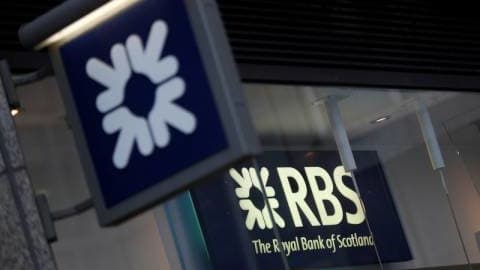
By Iain Withers and Lawrence White
LONDON (Reuters) - Royal Bank of Scotland's new Chief Executive Alison Rose unveiled a new strategy for the taxpayer-backed bank on Friday, including radically cutting back the size of its loss-making investment bank and renaming the company NatWest.
Rose, who replaced former CEO Ross McEwan in November to become the first woman to lead one of Britain's major banks, is hoping a rebrand will help rehabilitate the lender's image after years of scandals following a 45 billion pound taxpayer rescue during the 2008 financial crisis.
Although the RBS brand will live on in Scotland, the bank will stop using the 293-year-old name at group level and adopt the NatWest brand that grew out of National Westminster Bank, which RBS bought in 2000 and which consistently polls as more popular in customer satisfaction surveys in Britain.
The new strategy and better-than-expected profits were, however, overshadowed by a lower than expected eight pence dividend, sending shares down 6% in morning trading and demonstrating the challenge Rose faces to win over investors.
The payout will amount to 1 billion pounds, including a 600 million pound windfall for taxpayers, who still own 62% of the bank.
RBS Chairman Howard Davies told reporters the bank's preference was to use excess capital to buy back stock from the government as and when it restarts selling following the March 11 budget.
Rose's strategy includes plans to halve investment bank NatWest Markets' risk weighted assets to 20 billion pounds ($26.10 billion).
She also said making the bank greener would be a top priority to help tackle "one of the defining issues of our generation", following similar strategy updates by BP and Blackrock in recent weeks.
The bank will stop financing coal power stations by 2030 and is aiming to make its own operations carbon positive by 2025.
'HORRIBLE OUTLOOK'
Analysts took a dim view of the update, with KBW saying there was "no end to the building site" at RBS and the outlook was "horrible".
"We believe investors will be disappointed with capital return," said Joe Dickerson, an analyst at Jefferies.
The lender reported pre-tax profits of 4.2 billion pounds for 2019, 24% higher than 2018 and above analyst expectations.
But the results were dented by a loss of 121 million pounds at NatWest Markets and a previously announced 900 million pound provision to compensate customers mis-sold loan insurance, part of a wider industry scandal.
Despite the planned cuts to NatWest Markets, the group signalled it will slightly ease the overall pace of cost-cutting, to 250 million pounds of savings this year from 307 million pounds in 2019.
However this will still likely result in further significant job cuts, after the group cut staff numbers by 3,000 in 2019.
Rose, who started as a trainee at RBS and has worked at the bank for more than 27 years, declined to comment on expected job losses this year.
The bank said it would target a reduction in its core capital buffer to 13 to 14% over the "medium to long term", down from 16.2% in 2019, and a return on equity of 9 to 11% over the same period after hitting 9.4% in 2019.
RBS confirmed Mark Bailie, the boss of fledgling digital bank Bo, had quit and would leave with immediate effect, amid investor concerns about the venture's commercial viability.
Bailie will be replaced by Marieke Flament, the boss of digital brand Mettle, who will run both businesses.
($1 = 0.7663 pounds)
(Reporting by Iain Withers and Lawrence White; Editing by Rachel Armstrong, Kirsten Donovan)